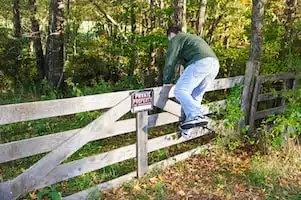Criminal trespass under Washington law is an offense where a person enters or remains in a building or other premises without permission or authority. The crime can lead to severe penalties including fines and a jail term of up to one year. If you or a loved one is facing a trespass charge, contact an experienced Seattle criminal defense attorney now for help.
What is Criminal Trespass?
Washington’s criminal laws carve out two forms of trespass. These are trespass in the first degree and trespass in the second degree. Both are serious charges.
Under RCW 9A.52.070, criminal trespass in the first degree is the offense where a person “knowingly enters or remains unlawfully in a building.” Consider, for example, a situation where a young adult is walking home through a business district one night. The person sees an open door to a storage warehouse. If the person enters the warehouse without permission, he/she is guilty of first-degree trespass.
Under RCW 9A.52.080, criminal trespass in the second degree is the offense where a person “knowingly enters or remains unlawfully in or upon premises of another under circumstances not constituting criminal trespass in the first degree.” An example is when a person lingers on a home’s porch or yard. If the person does not have the permission of the homeowner, he/she is guilty of second-degree trespass.
What are the penalties for trespass?
Criminal trespass in the first degree is charged as a gross misdemeanor (as opposed to a felony) under Washington law. The crime is punishable by:
- custody in county jail for up to one year, and/or
- a maximum fine of $5,000.
Criminal trespass in the second degree is charged as a misdemeanor. The crime is punishable by:
- custody in county jail for up to 90 days, and/or
- a maximum fine of up to $1,000.
Are there Legal Defenses in Trespass Cases?
Fortunately, people accused of trespass can challenge the accusation with a legal defense. For example, an alleged offender can assert that a building or structure was either abandoned or open to members of the public. Defendants can also use the defense that he/she entered a building or other type of property with the permission of the building/property owner.
Further, both first- and second-degree trespass require that an accused act with knowledge. This means defendants are only guilty of trespass if they enter a building or property knowing that they are doing so and that the property is off limits. A defense, then, is for an accused to show that he/she did not have this knowledge. Perhaps, for example, a defendant was found on a piece of property (without permission), but the defendant reasonably believed it was public property.
Contact Black & Askerov for Help
While a defendant can raise a legal defense to challenge trespass charges, it will take a skilled criminal defense attorney to raise the best defense. The experienced attorneys at Black & Askerov have over 25 years of combined experience defending clients on trespass charges. Our Seattle criminal defense lawyers have the skill and commitment that makes all the difference in these types of cases. Black & Askerov will fight tooth and nail for you at every step of your case. Contact us now to get the legal help you deserve!






